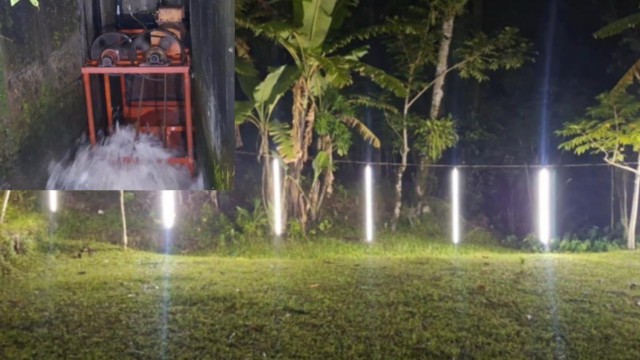
Photo: Voice7 News
Monirul Islam stands beside his self-invented hydroelectric device installed near a sluice gate in Barguna, Bangladesh, where river currents are used to generate free electricity for the local village.
Barguna, August 13 (V7N) — In a remarkable display of grassroots innovation, a man in southern Bangladesh has developed a low-cost method to generate electricity using river currents, offering a potential alternative source of renewable energy in remote areas.
Monirul Islam, a resident of Purakata village in Barguna Sadar Upazila, has successfully harnessed the natural force of flowing water through a device he personally designed and installed near a sluice gate on the Payra River. The system generates electricity without the use of fuel or external power sources, solely driven by water flow.
The device operates as tidal waters flow through the sluice gate, turning the system’s rotating mechanism and producing uninterrupted electricity for 15 to 18 hours a day. According to Monirul, the setup powers over 50 electric lights in the village, providing a stable and sustainable energy source during most of the day.
Monirul, who works as a fuel distributor, developed the system over three months with a modest investment of just Tk 70,000. Motivated by a desire to reduce dependency on imported fuel, he believes this innovation could serve as an effective alternative for energy generation in areas where flowing water is available.
“If given the opportunity and support, this technology could light up village after village at no cost,” Monirul said, emphasizing the potential for widespread application of his invention.
Mechanical technician Zahid, who assisted in the construction, noted that careful measurement and placement within the sluice chamber were crucial to ensuring the device's functionality and success.
Coastal journalist and researcher Shafiqul Islam Khokon praised the initiative as a pioneering example of sustainable energy generation at minimal cost. “This invention demonstrates how the power of nature can be utilized efficiently to illuminate entire communities,” he stated.
Local residents expressed pride and optimism about the project, seeing it as a step toward energy independence and environmentally friendly development. Civic observers believe that such grassroots innovation, if scaled and supported properly, could open a new chapter in affordable and decentralized electricity production for rural Bangladesh.
Monirul’s invention comes at a time when energy security remains a pressing issue for many developing regions. His river-current-based generation method highlights the potential of local solutions to contribute to the broader transition to renewable energy.
END/MRR/SMA/

Comment: